Our Favorite Facts about Worms
Post Type: Blog Post
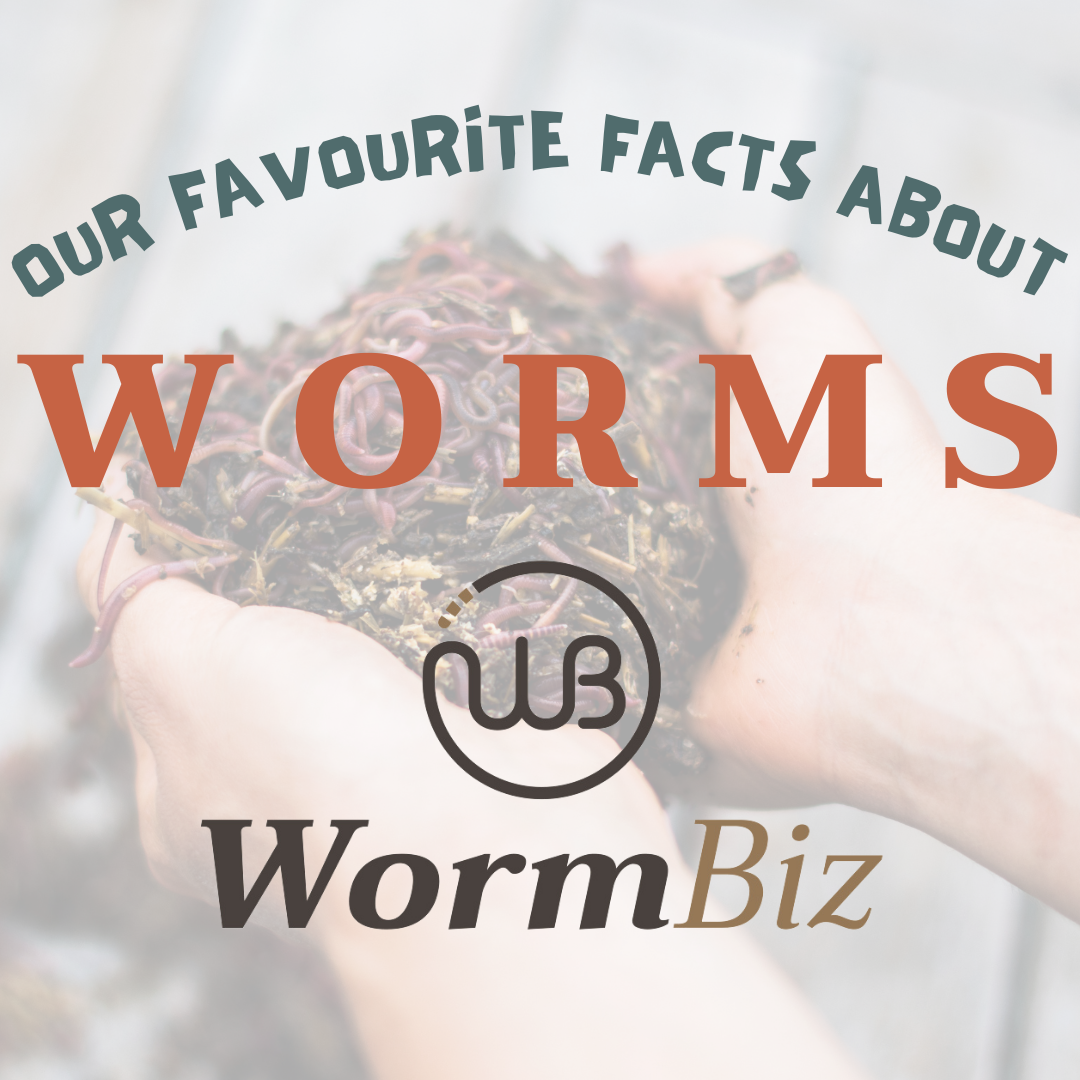
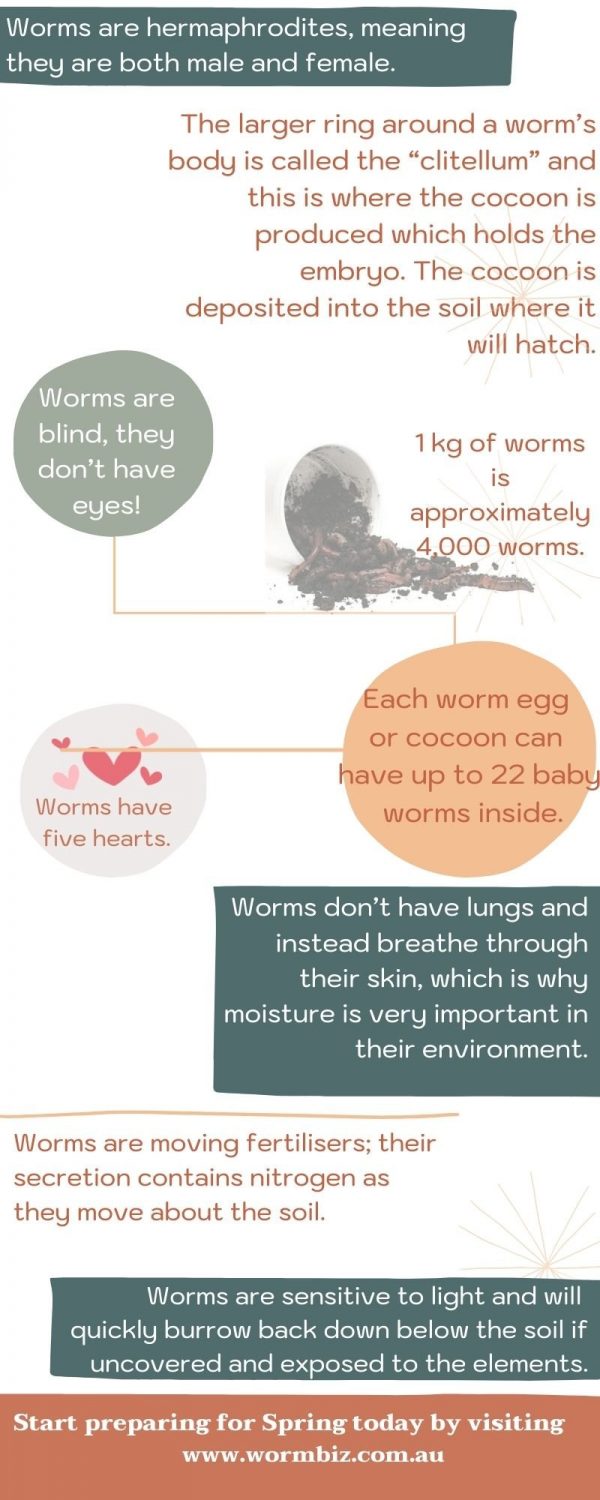


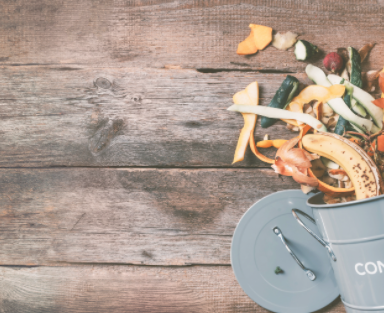 What to feed your worms? What not to feed your worms?
What to feed your worms? What not to feed your worms?
Worms don’t actually ‘eat’ food scraps but instead feed on the bacteria and fungi that covers food waste and other organic matter to break it down. The decomposition process occurs at different rates depending on the food source.
Fruit and vegetable scraps – work well; ideally cut them up small, so they break down faster.
Cereals, grains and carbohydrates – work well, either cooked or uncooked.
Manures and compost – organic materials such as cow and horse manure and compost already contain large amounts of organisms so the worms can process more, faster. However, be careful not to feed your worms manure from animals that have received deworming treatment in the two weeks prior to manure collection.
There are some types of foods that worms don’t enjoy as much and can take much longer to break down, becoming problematic in your worm farm. They can become smelly and could encourage unwanted visitors such as blow-flies or vermin and put the farm out of balance. If you farm does turn ‘sour’ remove all food, and mix up the remaining material in the tray with your gloved hands. It can also be helpful to apply a sprinkle of lime or worm farm conditioner. Recommence feeding with more suitable materials.
Onion – Onion is on the bottom of the worms ‘favourite food’ list. Small amounts are OK, but too much can turn a worm farm acidic and unbalanced. Therefore it is best to avoid.
Citrus – Takes a long while to break down and worms find it difficult to process. Citus is best in the compost or dry peel and use for tinder.
Dairy – It is possible to feed a worm farm small amounts of dairy, however it works best diluted with water. For example, yogurt diluted with water and poured over worm material. This helps disperse the high protein and fat evenly so the worms can eat it before it has a chance to turn off.
Meat – It is possible to process a very small amount meat in a worm farm, however it does take time to break down and you would need to bury it deep under the soil in the trays to discourage blow flies and ultimately maggots… eww! For these reasons it is probably best to avoid altogether.
The generic answer is worms can eat up to half their own body weight every day although this depends on the type of food they are eating and how often are they being fed. You will learn how much they can eat as you become familiar with your farm. Checking on your worms every couple of days when starting out is the fastest way to learn what your worms do and don’t like. It will take several weeks for your worms to establish themselves in their new environment and process waste to their full potential. It is always a great sign when you see a bunch of worms balling up or congregating around the food source.
When starting out a worm farm, about 250 grams or two handfuls of chopped food scraps every couple of days is recommended. It is a good habit to sprinkle a small amount of compost, soil or straw after each deposit. As your worm population grows, the amount of food you can feed also increases. A worm farm working at full capacity with high numbers should be expected to process 2-4 kgs of food waste every week.
Chopping the food scraps into small pieces and spreading it evenly over the surface instead of dumping it in a large heap, and keeping the farm moist but not too soggy makes for the ideal environment. A worm blanket is also helpful as it creates a darker environment to encourage the worms to come to the surface and feed. This could be made out of a moist thick piece of cardboard cut to size or a some hessian material such as an old potato sack. Giving the worms more area to feed in is another great way to process more waste; you can do this by simply adding a second feeding tray or having additional worm farms. Alternatively, you could also use an in ground worm farm to supplement your primary worm farm. There are a variety of different ways you can extend your worm farming success and process more waste material. Why not try up-sizing your farm to a DIY bathtub?
Your worm farm could become smelly and you might find evidence of fly larvae (maggots). Some foods are high in energy and when breaking down release that energy in the form of heat through a relationship with bacteria. As the populations grow, more energy is consumed, resulting in a bi-product, heat. When food is clumped together and is not spread in a light even pattern then worms have problems eating so much food before the heat sets in and then worms can’t eat it. Once the temperature exceeds 35°C worms are in survival mode and often leave the area where the food and heat is. During winter this can be an advantage, as the increased temperatures suit the colder conditions. If there is to much food, remove excess and mix up the material in the tray. Add some moisture and straw material.
Feeding food scraps to the worms causes the pH to lower. An unbalanced farm can become smelly and icky for you and the worms. This can be managed by adding carbon in the form of leaves and mulch or by adding a sprinkle of lime or conditioner when feeding your worms.
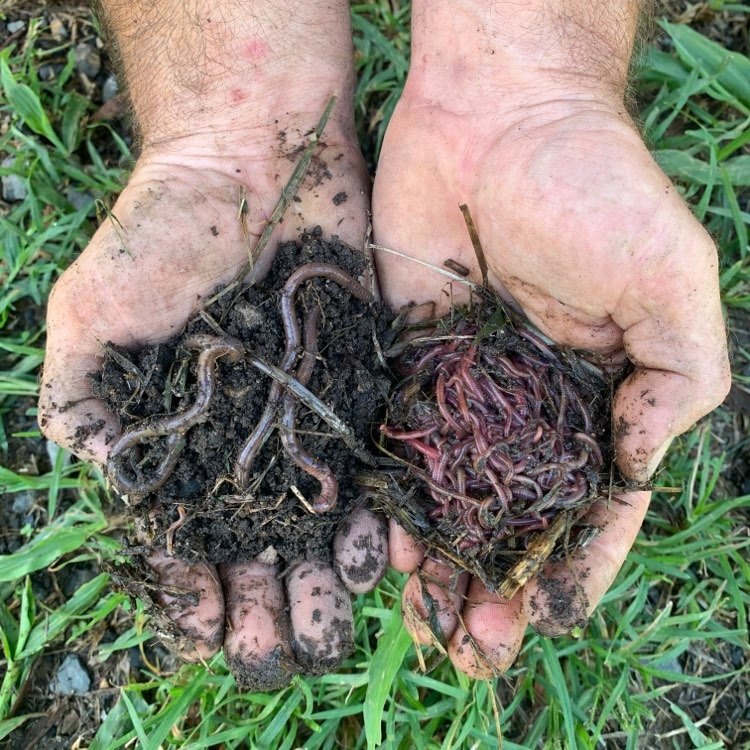
When starting a worm farm, it is best to source “compost worms.”
Here are the reasons why:
There are lots of species of soil earthworms naturally found in a healthy garden. Earthworms are deep burrowing and quite amazingly, secrete slimy mucus, which helps them move through their tunnels with ease, not only aerating the soil but leaving behind a microbial, nutrient-rich residue that plants can access for their growth and vitality. Earthworms have bigger mouths than compost worms and consume larger soil aggregates and organic particulates such as rotten wood but what they really love is to feed on organic material already processed into rich humus.
Earthworms are much larger in their overall size. They require open space to move freely and therefore won’t thrive in a contained densely populated environment such as a home worm farm.
Compost worms are surface dwellers meaning they spend their time closer to the soil surface where natural decaying matter such as leaves, grass, and manure presents. This is one of the reasons why compost worms are so effective in a home worm farm situation. When we place food waste on the top layer of a worm farm, the worms don’t eat these scraps but consume the microbes present in the decomposition process.
Compost worms also secrete enzymes that assist in breaking down the organic matter, once processed, nutrient-rich worm castings are left behind. Compost worms can live in much higher densities, ideal for a contained worm farm environment, which can effectively process organic waste materials particularly kitchen scraps.
It is important to mention compost worms can live in the garden but require a moist environment with plenty of decaying organic matter such as a thick mulch layer to thrive.
To answer the question, can I put worms from the garden in my worm farm? The answer is no, not really.
The main reason why earthworms won’t fare well in your worm farm is that they require a different environment and living conditions to what a worm farm can provide.
They are much larger than compost worms and don’t like to be part of a densely populated environment; they also prefer to feed on organic matter already processed into rich humus.
Compost worms are most suitable for your farm and will thrive in a contained environment, they enjoy processing organic household waste at the surface of the soil and are very effective worm castings producers.
The great news is, both types of worms work together in a symbiotic balance.
Soil earthworms love feeding on compost worm castings. They will transport it to the soil’s lower depths where the root zone is, giving plants access to superpowered all-natural nutrients for growth, natural pest resistance resulting in nutrient-dense healthier food. One of the best things you can do to grow and encourage the earthworm population in your soil is introducing compost worm castings throughout your garden.
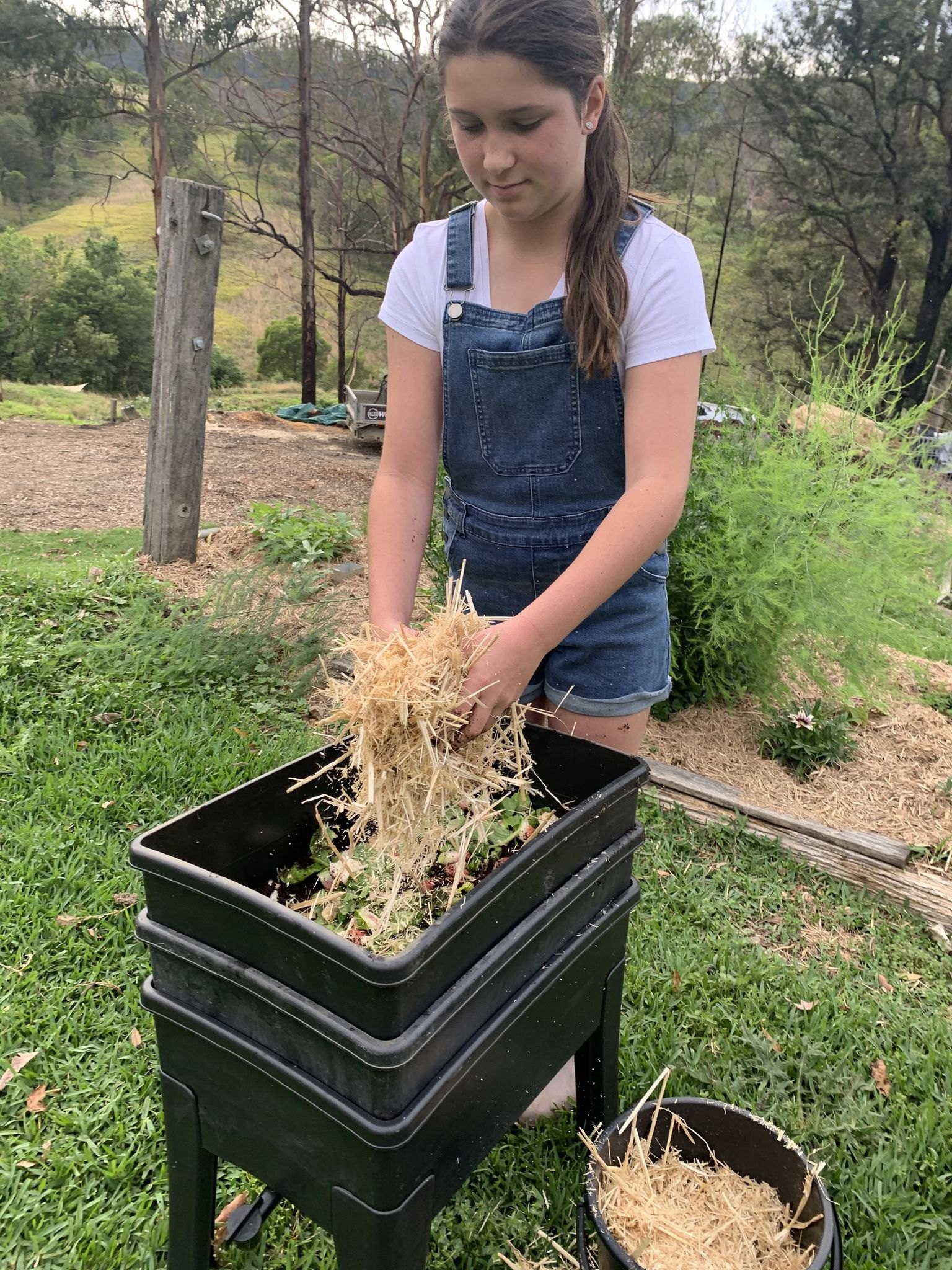
Winter is coming! Here’s some simple things you can do to ensure the worms in your farm stay warm and cosy!
Composting worms can be less active during the cooler months. To keep them lively and consistently processing food waste into worm castings all season long, winterise your worm farm today by following these easy steps!
Location, location, location- Reposition the worm farm somewhere sunny and protected from the harsh winter winds. Consider placing an old blanket or tarp over the top. The garage or laundry are also good places to keep your farm productive all winter in extreme conditions.
In colder conditions, the food decomposition process slows down and therefore the worms can take longer to process waste. To help with this, chop or blend food up smaller.
Organic waste material heats up as it decomposes, worms are not only attracted to the food source but the warmth it creates. This is a good thing as it means they would much rather spend their time in the top feeding tray than keeping cool in material contained in the lower layers. *One of the best things about the winter worm farm is there is a lot less risk of overheating like in the Summer months.
Apply straw or mulch after adding food scraps to help keep the farm well balanced and insulated, follow with a light watering. Place a worm blanket such as a piece of hessian or moist thick cardboard cut to size over the top of this to encourage the worms to come to the surface to feed.
If you don’t notice many worms balling up around the food source, check that there aren’t any trapped in the bottom tray or reservoir. If there aren’t any to be found down there, you may need to consider boosting your farm with some more worms. More worms will help create more heat and ensure you can continue processing waste material all winter long and be rewarding you with lots of organic castings in time for the spring garden!
Moisture is still necessary for the worms to thrive in their environment, cut back on watering slightly and ensure the material stays moist but not too wet. Avoid adding freezing cold water to your farm. Lukewarm is best.
Remember, always leave the tap on your worm farm OPEN. This allows water to drain right through into a bucket and saves worms from drowning in the reservoir and contributing to the chill factor in their home!
By implementing these seasonal changes, winterising your worm farm will encourage a multiplication of your worm colony, allow you to process more food waste destined for landfill and produce an abundance of organic castings in time for the spring garden!
Check out the worm help centre for lots more info or visit the worm store and our team will package up some healthy, happy and hungry compost worms to send direct to you! Free shipping.
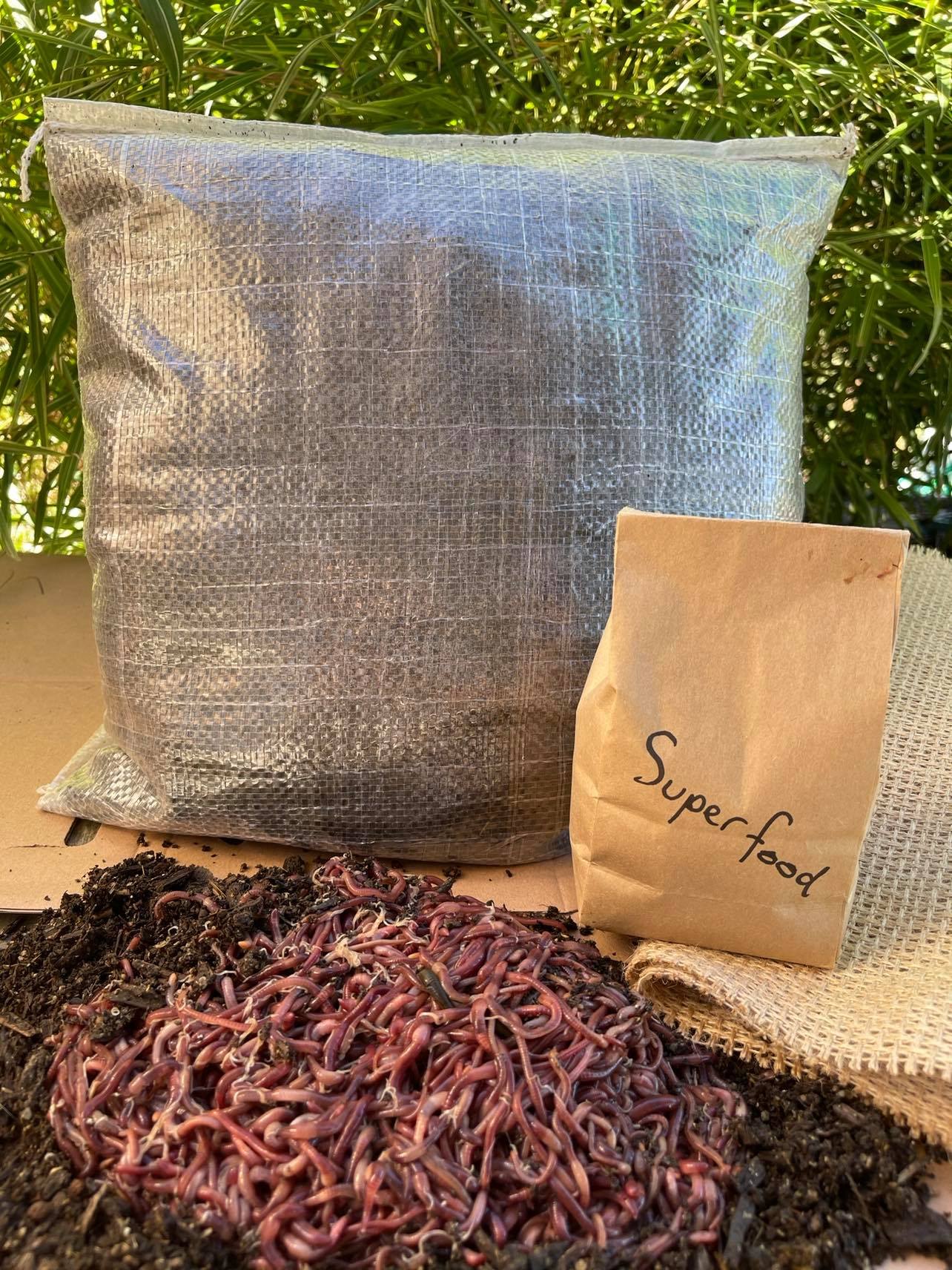
INCLUDES
A massive 1kg (approx 4,400) Live compost worms packed in quality bedding material containing worm cocoons (eggs).
1 Bag of worm superfood to help the little guys settle in.
1 Hessian worm blanket
Express postage
We have found that the best way to ship worms around the country, is to get them in the post on Monday, So Australia post have the whole week to get to you and worms don’t get left at the post office over the weekend!
Packages normally take 2-3 days but can occasionally take up to five if outside the urban areas.
Note: If extreme weather is expected we will send a quick email to notify you of an alternative shipment date.
Unfortunately WormBiz cannot ship live worm products to Western Australia, Tasmania or the Northern territory, due to complications with quarantine, heat stress and long distance. We would however like to offer you access to the information provided by our website. Please see link provided to purchase worms from within Western Australia and in the Northern Territory, please search locally.
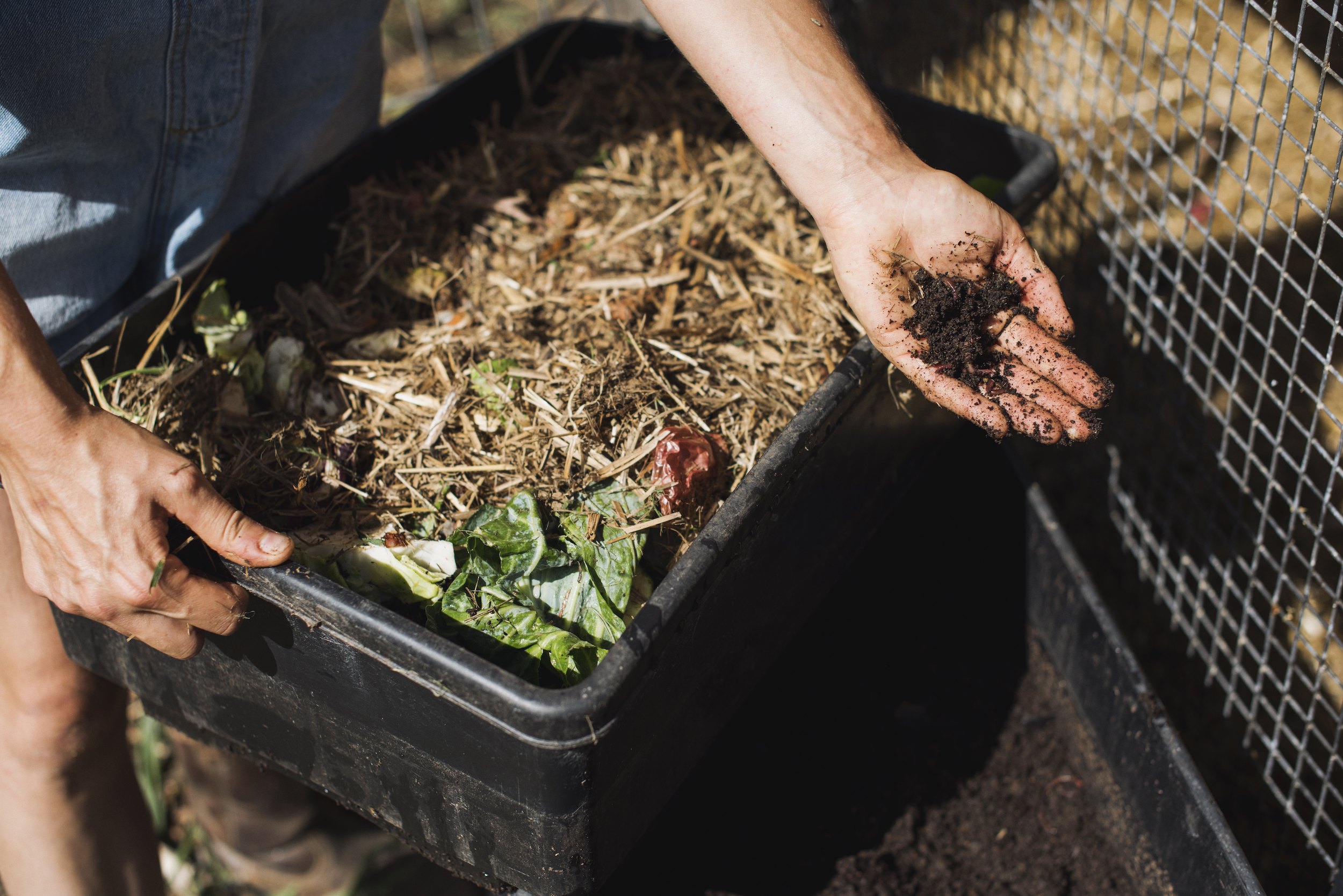

6 years since we started out here and it is hard to believe it has been our toughest year yet! The last 2 months have been particularly emotional for us and our small community. Catastrophic fires destroyed a total of 9 homes here in Killabakh and caused damage to many properties. Our farm came severely under threat twice, both times we believed everything we had worked so hard for was gone. A mix of luck, Pete’s determination, our small fire crew and a water bomber helicopter on one of the days all contributed to our place being quite unbelievably saved. A lot of our 10 acres has been burnt, we were lucky to only lose our water tank, some farm equipment, nursery stock and one of our tractors.
Fire is so tangible, unlike the slow but steady soul crusher that is this relentless drought. Farmers in our community and of course all over Australia are doing it so tough. This is a feeling we have been somewhat immune to until now as we had the foresight to invest in a water security earthworks project here in Jan 2018 which captured the last substantial rain we have had here. Our number has finally come up as slowly but surely both our water sources for the farm have dried up. We require approx. 3000L per day to run the worm operation in summer, Peter estimated our available water would last us up until Xmas eve 24th Dec. We formulated a plan to purchase a water tank for the trailer to cart water to the farm, this will be a daily occurrence until rain arrives and fills our water storage once again. This is absolutely not ideal for us as it is costly and time consuming. We can appreciate how lucky we are to have lasted this long considering our water usage and despite it all we will be in a good position when the rain does grace us with its presence.
We have been humbled by this whole experience as it has been a huge reminder to value the things most important to us. We pride ourselves on rising to challenges together and are confident in our plans and inner strength to help support our community and ourselves through this difficult time.
The start of the year feels so long ago, we took a trip to Fiji for a friend’s wedding and some much-needed family time. We visited a permaculture farm deep in the Sigatoka valley which saw us trekking through food forests and lush hills in the pouring rain. We were inspired by local villages natural examples of permaculture, sustainable off grid living and management of animal systems. We made some great connections and are looking forward to returning in the future with better local knowledge next time around.
After 12 months of living with a worn out home solar system which only provided us power during the day when the sun was shining. We finally were in a position to upgrade to a 3kw system, which has been life changing.
The worm operation has kept us on our toes this year with not a lot of time for much else. Tilly the tumbler has been hard at work which saw us supply many bags and trailer loads of nutrient rich worm castings to organic gardeners. Worms are in high demand resulting in record store and online sales and we enjoyed hosting many farm tours and garden clubs throughout the year. We have had a few worm fatalities in the post lately mostly due to the extreme weather conditions and package handling being out of our control. In early December made the difficult decision to suspend our online sales until March while we readapt our postage methods and the weather cools.
The girls are both well and growing too fast. Lacey and I have been enjoying learning the art of beekeeping, she was also very excited to perform in a local production “Marry Poppins” at the start of Dec, she nailed it and we are very proud of her. Elke is starting to boss her big sister around and loves art and crafts! Pete always has something on the go and is currently getting to know the new girl in his life, a 14 tonne excavator he has lovingly named “Jurassic”. I am trying my best to use any in-between time to work on my book “Homesteading 4 Immunity” which all going well is due to be published in Nov 2020.
Despite all our efforts and produce early in the year, the veg garden has unfortunately gone to rack and ruin as we simply have not had the water to allocate to it. Despite the lack of moisture our fruit trees were shaping up to bare lots of fruit. As the land became drier, bower birds have taken up residence here for the first time ever and despite our best netting efforts and even trapping and relocating birds there is not one piece of fruit remaining which is very disappointing.
A quick look at 2020
We are not expecting any decent rain or relief from these extreme high temperatures until at least March. Elemental ecosystems water retention expert Zach Weiss is coming back out from America to our hillside property in Feb where we will complete further earthworks to maximise our water storage and create more space for worm production. It will also be a great opportunity for Pete to polish his machine operation skills under Zach’s guidance.
We will be looking at taking on paid help for the business later in the year, lightening the load in key areas to spend time developing other avenues available to us. We are also committed to free up more time to grow food and go on more family adventures!
I am looking forward to improving our living areas this year, particularly the bathroom! Pete saved our wooden cubby shower house within an inch of its life from fire. I’m still not sure if I am happy or disappointed about that, I know he is definitely happy there is still no “rush” for a replacement! We also have our sights set on a worm packing shed with guest accommodation partitioned off at one end which will really see us streamline our operation, this is probably more like an early 2021 achievement.
It’s been a hard year, but we are confident in the foundations we have laid down and know how great our worming life will be again when the ponds are full, the weather is cooler, and the winter garden is flourishing.
Be safe and best wishes for the year ahead.
The WormBiz Team
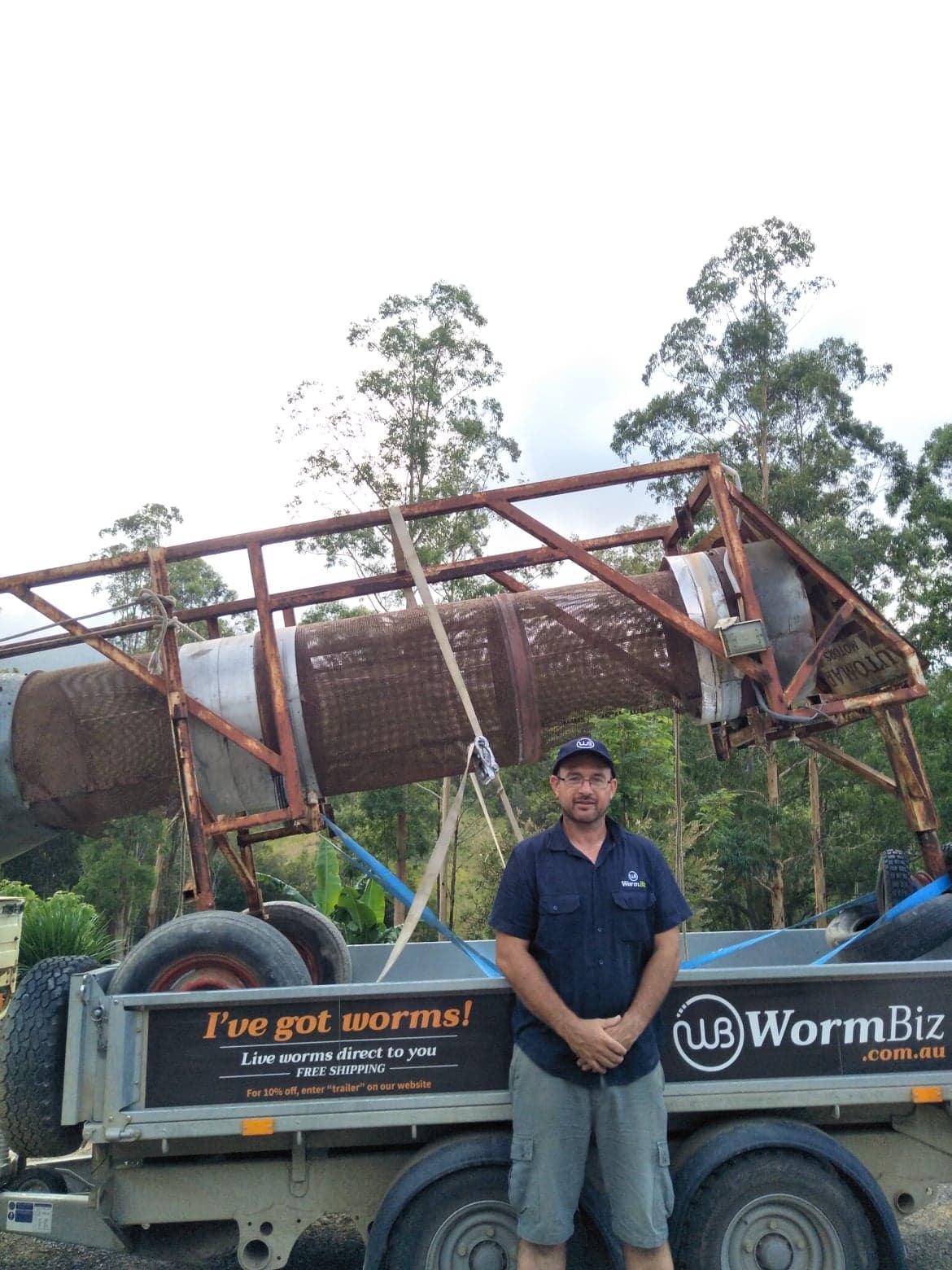
A year after the website launch our family team have been kept busy growing, packing and posting compost worms and castings to their new homes in QLD, NSW, VIC AND SA. We have also answered many wormy questions sent in from fellow worm warriors. Of course, there are always lessons to be learnt forcing us to grow and adapt, with only one order not reaching its destination safely which we were able to quickly rectify. I’m sure the poor Aussie post guy is still recovering from the stench of dead worms in his van!
The Earthworks developed here back in Jan literally saved our farm from the harsh drought through winter. Our original dam dried up and we were very relieved to be able to access water from a full secondary source. We are currently spending our summer afternoons working on this area, establishing water plants and entertainment areas, the girls are enjoying swimming and jumping off the dock too! We have kept in touch with many of the workshop participants who shared some of the journey with us.
Pete travelled to Canberra in April to present at the Australasian permaculture convergence and even had lunch with costa from gardening Australia!
In May, WormBiz was open to the public for the Landcare farm gate tour, we ran four info sessions throughout the day and had some great feedback from our guests. We also demonstrated worm farming practises at workshops and garden clubs up and down the east coast and have even managed to get some groupies!
WormBiz has created trailer envy all over town with the new rig. The double axel hydraulic tipper trailer has allowed us to easily deliver commercial loads of worm castings, mostly to organic growers. The trailer has also created the opportunity to collect more waste streams for our farm to process and therefore flourish.
We were very grateful to meet Marty from “Marty’s garden show” this year, he and his daughter Karin visited our farm and shot a great first video “Aussie worm farmer shares top tips” which really got the word out there. Together we ran a competition asking for the best worm fact and received some very interesting new info! “Did you know the ancient Egyptians were the first to recognize the beneficial status of the earthworm? Cleopatra (69 – 30 B.C.) recognized the earthworms’ contribution to Egyptian agriculture and declared them to be sacred. Removal of earthworms from Egypt was punishable by death. Egyptian farmers were not allowed to even touch an earthworm for fear of offending the god of fertility” the lucky winner of this great fact was posted our popular premium worm pack!
We purchased some European night crawler breeding stock to diversify our range to include bait worms. They have proved to be more difficult and slow growing than the traditional compost worms we already grow but are confident we can continue to build this side of the business.
Samples of our worm castings have been sent to the environmental analysis lab at southern cross university in Lismore for extensive testing to find out just how great this stuff really is and what we can incorporate to make it even better! We are waiting with great anticipation for the results and will be sure to report back when we know more. Tilly the tumbler was hauled out of the bush and transported down the highway to an engineering workshop where she will be brought back to life and put to work in the new year helping us to create amazing soils full of life.
As summer approached Pete had to psych himself up to the yearly task of rigging up the shade cloth on the new terraces to protect the windrows (worm beds) from the harsh sun. About 30 rolls of 20m cord and 300m of shade cloth later, its done! With only one spill off the side of the ladder the worms and Pete are very happy!
On the home front
Our Lacey took out the ‘best trick’ category at the Killabakh pet show by perching her chicken moonlight (wearing a bow tie) on one arm while balancing on one leg, a well-deserved win! Her little sister Elke won “smallest pet” by entering… you guessed it- a can of worms. One of the yearly highlights for This off-grid mamma would have to be upgrading the twin tub washing machine, followed closely by a basin in the make shift bathroom, no more brushing our teeth in the kitchen!
The veg garden has been fairly productive on a home scale and our fruit trees are in good health. We are currently indulging on an abundance of white peaches and even some plumbs this year! Not much animal production this year, it was great to have a break from animal rearing, but we are definitely missing our home-grown pork at this time of year.
Big plans for WormBiz next year, hoping to deliver great video content, informative blog posts and offer high quality veganic worm castings! As well as continue to grow happy, healthy worms for all the future warriors out there!
Merry Christmas from our family to yours, best wishes for a happy and healthy 2019
The WormBiz team
Pete, Anna, Lacey & Elke
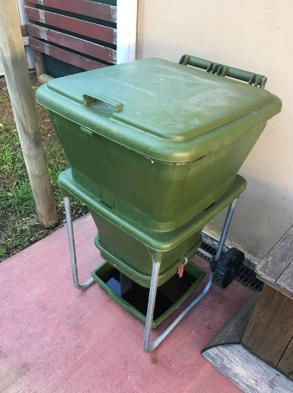
What a fantastic piece of equipment that has made composting such an easy part of my day. I have had the bin now for roughly two years and have loved it. With minimal work I get to watch my food scraps turn into worm castings and wee which I then get to use on my garden. Talk about amazing cycles!
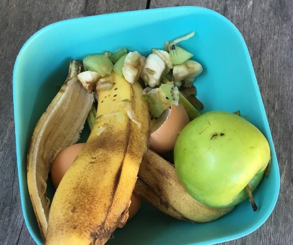
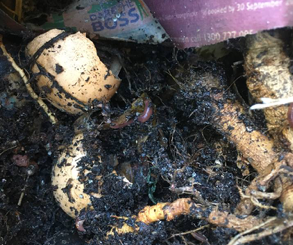
So, where did this relationship begin? I was provided with a bin by the Axisa’s and we filled it with compost mixture and some worms! It was a slow process to begin with as the worms need time to settle in and start to multiply. During this time they need to be fed much smaller amounts of food, but within about two or three months it took off! The worms were multiplying quickly and I couldn’t keep up with my food waste. This process has definitely made me eat more fruit and veg. After two years I think I have a pretty good relationship with my worms! I feed them and they provide me with nutrient dense worm casting and wee to feed my garden.
After about six months (give or take) the first lot of worm casting was ready to be removed. A very simple process, just undo the red clips on the side and the bottom of the bin comes out and you get a nice square of worm cast. I used this on my veggie garden to increase the nutrients in the soil.
The worm wee drips out from the bottom of the bin into the tray and is very easy to use! I add it to the bottom of my watering can and dilute with water and then water my garden, my rose bush and my pineapple in particular have taken off!
To keep my bin nice and healthy I follow the general rule of a layer of green followed by a layer of brown, so as you can see in the pictures I add torn up, wet newspaper or shredded paper to my bin about once a fortnight, and food scraps daily.
Worms eat nearly everything! So there is not much that I leave out of their diet, however I do avoid dairy, meat, bread, citrus and onions and garlic! Sometimes they get small amounts however I definitely try my hardest to keep these items out of my bin! Everything else goes in! Banana skins (if I don’t add them to my smoothie!), egg shells, apple peel, fruit and veg off cuts and skins! It’s great! I do make a point to put my fruit and veg off cuts in the bin on a daily basis, I find if the fruit/veg starts to rot it makes my bin smell a bit. As long as this doesn’t happen you would never be able to sniff out where my bin is located!! I am also cautious as to what worms to add to my bin to boost it as there are some products on the market that are not healthy. Whenever I have a question Anna and Pete at WormBiz are always happy to help out!
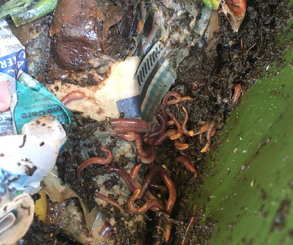
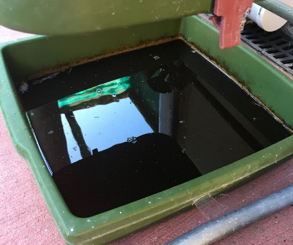
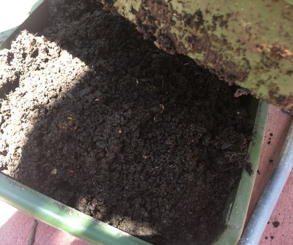
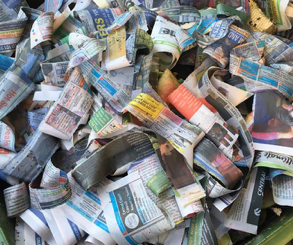
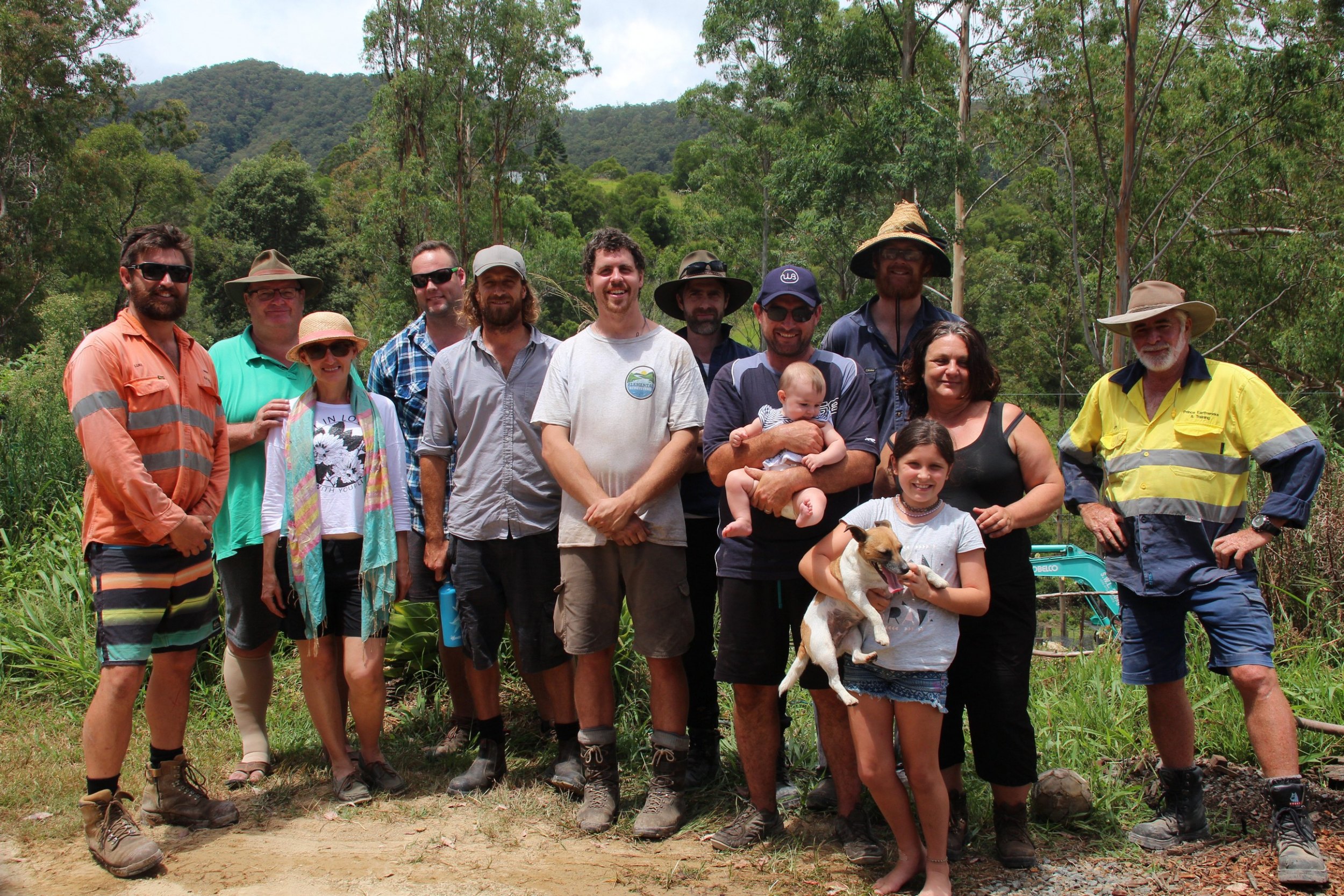
Permaculture earthworks – an open consultancy with Zach Weiss (Protégé of Sepp Holzer)
Our vision
It isn’t very often that a farm undergoes a complete overhaul and it’s one that can be daunting. So this time we chose not to do it alone. Here’s a closer look into working with a professional consultant, from the design phase through to implementation, and the joy of sharing the experience with 10 enthusiastic people.
This next stage in our “farm journey” has proved to the biggest and most ambitious and one that, most importantly, would build resiliency into our farm business and also into our lives. We jumped at the opportunity to have Zach Weiss help us tackle the big decisions we faced.
Zach is from Elemental Ecosystems and trained with ecology specialist Sepp Holzer. He’s the first person to earn the Holzer Practitioner certification directly from Sepp after completing a rigorous two-year apprenticeship working on projects in Europe and North America. The excellence of work performed by Sepp and Zach speaks volumes of what’s possible in creating water-retentive landscapes. Our group was captivated by the expertise of Zach’s presentations and the insight into the array of projects he and Sepp have undertaken worldwide.
Our farm’s transformation revolved solely around water – its flow, capture, storage and use. Starting with the site’s analysis, we were able to initiate elements of design, form a working plan, then organise and move into the implementation – major earthworks! The most important component was keeping an open dialogue with Zach.
Key points for site analysis
Slope, vegetation (including large trees), land formation and gradient, solar aspect, water flow, material/soil types and property boundaries.
Earthworks can be very expensive and putting our ambitious, yet achievable, plan into action proved to be the most difficult part. Problems can happen along the way and these significantly affect what you can physically get done and, of course, the final cost. I learnt many valuable lessons and realised that my previous communications with contractors have been absolutely to my disadvantage when the job was done incorrectly and hugely more expensive than I would have liked.
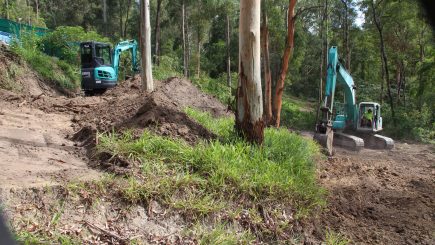
Test slices
The real learning curve for me, and the participants, was the limitation on the design without the right information. It didn’t matter about the previous proposals or plans we had in mind because until we knew what was beneath the surface, we didn’t know what strategies were needed. It is now clear – from here on I need to design around what is in the ground not how the land formation seems.
Not only did we have 10 participants here itching to get into the project, we had a 23 tonne excavator on site too. Problems remember? Our first arose at the start – the digger got stuck in the driveway when one of its tracks dislodged during unloading from the float. Our access was blocked for the next 12 hours while the machine was repaired; and this proved to be the first good lesson in how to deal with things going wrong. As part of the open consultancy, participants were able to work through the issues and saw many decisions being made that were not part of the plan. The machine was a big tired old girl and considering the amount and type of work we were attempting, a slipped track this early in the game was a concern. Nonetheless, we continued on and this minor speed bump made one thing clear – check when hiring equipment – its age, reliability and condition.
Expertise matters
It is essential to have the knowledge and experience on hand if and when difficulties arise. Our plans were changed as we went along and that was the beauty about working with a seasoned professional – it gave us the ability and flexibility to process problems effectively. Zach was great and always prepared to get dirty when the dirty needed to be done! Experience is a major factor and knowing how to adapt to make good decisions quickly is essential to ensure the work is performed correctly. We all hear that sometimes contractors will take short-cuts to suit their own purposes, but ultimately you are the one that wears the cost. So this is when a consultant pays dividends.
Day one
A farm tour and site analysis was done first thing on Saturday morning and the group could see the reasons why test slices are so critical to a successful dam project. The earth samples allowed us to determine three possible sites – but all had advantages and disadvantages.
The first possibility looked a good dam site but this waned as the amount of desirable clay material diminished with every bucketful we extracted. The second site produced a good slice as we found some pretty good clay deposits but the size of the dam wall and the lack of moisture deep-down was problematic, so we moved straight onto the next. The third slice, which ended up being our main pond feature, seemed to have some really good clay and the moisture levels were perfect as water seemed to be moving through the sub-surface. The only problem with this site, and why it was not our initial preference, was the constraints with property boundaries and natural water flow.
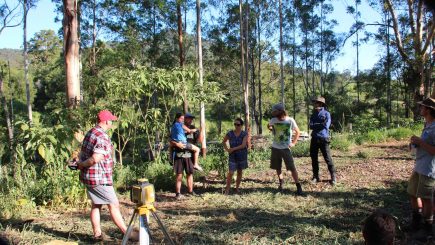
Day two
The second day started with a minor diesel spill before the bacon even started sizzling! Our acreage is steep and our visiting group parked cars and pitched tents nicely where space was at the ready. But the excavation contractor was short of space and parked the truck in an unusual position which resulted in fuel, from the refuelling tank, to pour out from a loose flange. We sprang into action with the excavator’s operator but it was some time before we were able to resolve the problem. Litres of diesel spewed onto my driveway. We have kept our place chemical free and this was the first time something like this has happened. It was hard to take and extremely disappointing – I did my best to capture it which resulted in keeping the discharge contained. Another valuable lesson – when working with contractors on your property careful consideration to equipment placement is paramount – check everything twice.
It wasn’t long before the machines were getting stuck into it. We had the big machine move some fallen trees and rework the bottom terrace that wasn’t built properly, so we had to entirely change the level for the water to actually run the right way. While the big machine was in action, the smaller three-tonner was removing top soil and making some room for the big girl to move-in later. The restriction with these two terraces was a couple of large trees that we were hoping to keep as privacy from neighbours and the tightness between the existing terraces.
“The expense of earthworks, especially when unforeseen circumstances come into play, like breakdowns, inclement weather and the wrong material types, can be quite overwhelming if you get half way through the budget and you’ve completed less than half the work.”
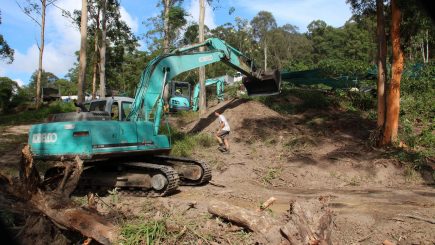
Terrace design
We run a commercial worm farm so knew that controlling leachate was going to be a big part of the design due to the high annual rain fall; around two metres. So designing a three pond system to deal with the large volumes of water and to remediate the nutrient was our best bet. As part of the project, we wanted to primarily control nutrients, treat the water and then reuse it in the existing worm production area. We also envisaged watering gardens and establishing potential vegie production plots. The first thing to get right on the terraces was the water flow and making them lean into the gully leachate ponds. Step two – they needed to be big enough for the worm habitat and allow vehicle manoeuvrability; to grow and service the worms using my small 23 horsepower tractor. And lastly, I wanted to build rigid overhead structures for shade and watering while having the ability to plant trees/shrubs/vines to utilise its framework.
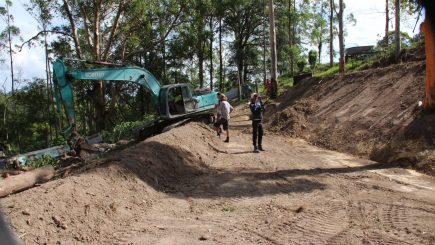
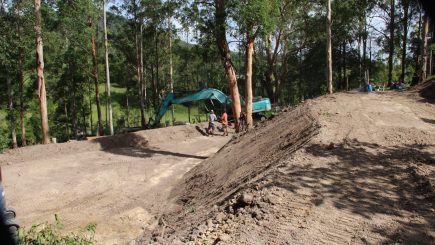
Terraces work
Terrace systems are beneficial in many ways and the more I work with them the more I’m learning about their true capabilities and value. Slowing water flow, holding water, steering water, flat areas for fast production and batters for trees and vines, are key elements. There is vertical potential too with the ease of building overhead shade structures, microclimates are prominent, accessibility is easy and the views are great. Terraces are special and once they are built correctly they will always produce well.
The water moving through the ground is cleaned and filtered by the whole ecology; it will be crystal clear and mineral rich, and the ponds soon will be abundant with life. Build it they will come! This is an elemental ecosystem and my family’s lives will become part of it; growing memories to share in the future.
The weekend was a real hoot and thanks to everyone that came along. A special thanks to Zach for coming all the way from Montana in the beautiful northwest of America. And most of all, thank you to my wife and family who opened their lives for all to see.
Stay tuned – there’s more to come.
I hope you can join us for the next one.
Follow us at Wormbiz.com.au
Thank you
Peter Axisa